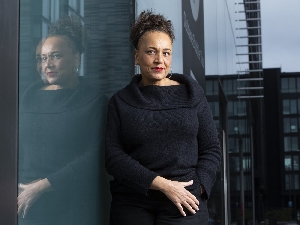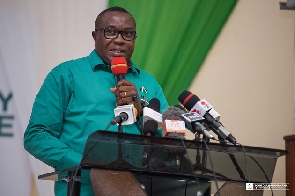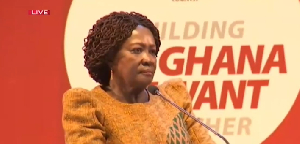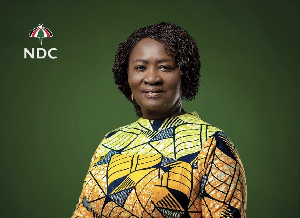 Ghanaian-Scottish architect Lesley Lokko OBE
Ghanaian-Scottish architect Lesley Lokko OBE
Lesley Lokko has become the first African woman to be awarded the Royal Gold Medal for Architecture, for her work to "democratise" the industry.
The honour is given by the Royal Institute of British Architects (Riba) and approved by the monarch each year.
Ghanaian-Scottish Lokko was also made an OBE in the recent New Year Honours list by King Charles, who is known to have a keen interest in architecture.
Riba commended Lokko's work focusing on Africa and the so-called Global South.
The 60-year-old is known for her work as an architecture teacher and academic in universities and other institutions around the world, rather than for designing grand building projects herself.
She has championed bringing people of colour and other under-represented backgrounds into architecture over the past two decades.
Lokko said being told about the Royal Gold Medal was "a slightly out of body experience".
'Moment of validation'
"It was something that I never, ever imagined would ever come my way," she said. "The first person I wanted to tell was my father who is no longer here. [It is] bittersweet in a way, but it was also an incredible moment of validation."
Lokko was speaking after receiving her OBE from the Princess Royal at the Palace of Holyroodhouse in Edinburgh on Wednesday.
The King issued a letter confirming Lokko's nomination for the Royal Gold Medal and inviting her to Buckingham Palace.
Dundee-born Lokko, who first met him as a teenager growing up in Ghana at a polo match, said she felt comfortable interacting with royalty despite having to tackle difficult conversations and complex issues around race and decolonisation.
"I think one of the ways to affect change is to be inside the institutions that you are trying to change," she said. "If I think back to 20 or 30 years ago watching something like an OBE investiture, I would probably not have seen a person of colour. Now that's very different.
"I think one of the ways in which you undo that history or that legacy of subjugation is by being represented. These sorts of moments are very special because you do it for yourself. You also do it for your family, you do it for your community.
"For me, it's important to be there. It's important to be on the stage."
Last year, Lokko became the first woman of African descent to curate the Venice Biennale's architecture event, where she focused on the themes of decarbonisation and decolonisation.
In 2021, she founded the educational African Futures Institute in Accra, Ghana, to further explore complex relationship between architecture, identity and race.
"When I started architecture, which is probably about 30 years ago now, there were only two people of colour in my class of almost 100. I think we were six women," Lokko recalled.
"My first impression was, oh, there's not many people who are like me here, and I was unsure as to whether I had the right to be there.
"So I always understood diversity, not just about numbers and about policy, but also about the narratives and the stories and the experiences and the perspectives that people from diverse backgrounds could bring to architecture."
Progressive approach
Lokko is also a best-selling novelist. Riba described her as a "renaissance figure", and its president Muyiwa Oki called her "a visionary agent of change".
"A fierce champion of equity and inclusion in all aspects of life, Lesley Lokko's progressive approach to architecture education offers hope for the future - a profession that welcomes those from all walks of life, considers the needs of our environment, and acknowledges a broad range of cultures and perspectives," he said.
The medal will be formally presented to Lokko in London in May.
Pakistan's first female architect Yasmeen Lari was honoured last year, and other previous recipients have included Dame Zaha Hadid, Sir Norman Foster, Frank Gehry, Frank Lloyd Wright and Sir George Gilbert Scott.
The Royal Gold Medal was first awarded in 1848 and is given to a person or group of people who have had a significant influence on the advancement of architecture.
- He was shot while going to send money to Ghana - Friend of Ghanaian killed in Canada
- Our thoughts are with the British Royal family - Akufo-Addo sends wishes to ailing King Charles
- 45-year-old US-based Ghanaian electrician falls to death from a 30-ft building
- Ghanaian-Scottish Lesley Lokko awarded architecture's Royal Gold Medal
- Tunisia and Italy to open migration 'hotline'
- Read all related articles












